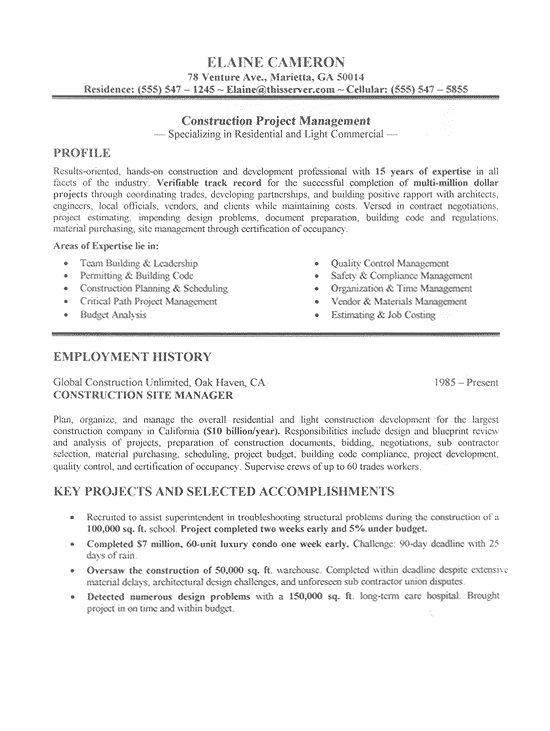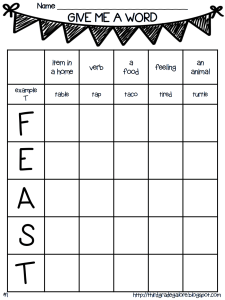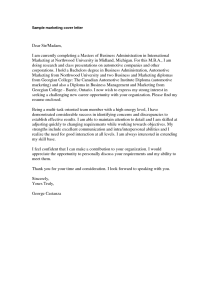Previous job titles or company names are. Feb 22 2021 While there are many ways you can use resume samples there are three main takeaways you should look for.

Construction Job Resume Sample Resume Writing Services Job Resume Samples Resume Examples
Your resume doesnt need to be any longer than a page.

Resume writing tips and samples. Feb 21 2018 RESUMES AND COVER LETTERS Aresume is a brief informative summary of your abilities education and experi- ence. Then expand on the career goals that you would like to achieve within the company. Weve put together a collection of resume examples for a variety of industries and job titles with recommended skills and common certifications.
Look for samples that relate to your industry or desired position. If you dont have anything worth mentioning you dont need to include this section on your resume and if you have just a single academic honor you can list it in the. Resume samples are simple and straightforward.
Make it simple and easy to read. 2 Keep It Short But Include All Necessary Information. This is because employers have a minimal amount of time to review your resume so readability is key.
It should highlight your strongest assets and skills and differentiate you from other can- didates seeking similar positions. Jul 23 2020 Start the phrases in your descriptions with action words like organized led calculated taught served trained tutored wrote researched inventoried created designed drafted and edited. Apr 01 2021 If you won a writing award were inducted into Phi Beta Kappa made the Deans List or earned any other meaningful honors be sure to include this information on your resume.
Answered the phone to take upward of 20 bookings each night If youre writing a restaurant resume with no experience you can still include soft skills on your resume. Writing a great resume is a crucial step in your job search. Types of Resumes Chronological sample p.
Spend as little as six seconds on an initial review of your resume. Sep 17 2020 Basic Resume Samples No matter what sort of work experience you have theres a resume format that will make your qualifications shine. Your history your goals and your value.
Unlike a resume objective a resume profile focuses directly on how you can benefit and add value to. Just back them up with proof. Start by summarizing your experience.
Oct 12 2020 For example if you listed customer service skills in your resume skills section you could add the following bullet to your work history. In most cases a recruiter or hiring manager is sifting through several resumes at a time to determine which applicants have the skills and experience necessary to move on to the next step in the hiring process. So heres 45 of the best resume writing tips we could find for every step of the resume writing process.
3 Use when experience education and activities are relevant to your career goals. If youre looking for a well-written example resume for inspiration we have a selection of resume samples to get you started. Mar 22 2021 An alternative to using an objective on your resume is to use a resume profile also called a resume summary statement or statement of qualifications which is a brief summary of your skills and experiences written for a specific job opening.
No matter who you are with help from our resume examples youll learn how to write a resume that can land you work in 2021. For your convenience weve divided the tips into two five and thirty-minute tips. That said no one said you cant use a little help.
Oct 17 2020 Your resume objective statement should include three main points. The following tips will help make your resume as easy to read and as effective as possible. Feb 26 2021 Keep these items in mind when writing a resume objective statement.
If you have a significant employment gap since your last position you may want to use a functional resume rather than a chronological one. Determine which format is best for you. For example mention your years of experience accomplishments or valuable skills.
Apr 19 2021 If youre a professional we have resume samples by job title including all of the relevant resume skills qualifications job description bullet points and achievements you should include to impress hiring managers. To write a successful resume you have to make it your own. Oct 13 2016 The best tips help you remember the smallest details of resume writing.
Follow the instructions above and if youre still in need of guidance review a few more samples and templates from sites like Resume Resource.

Resume Writing Tips Resumewritingexamples Resume Writing Resume Writing Tips Cover Letter For Resume

Cv Writing Advice Write The Best Possible Cv With Free Templates Cv Words And Descriptions E Resume Writing Samples How To Make Resume Good Resume Examples

Formatted Resume Sample Google Search Resume Writing Tips Resume Writing Resume Writing Services

Sample Resume Preparation Vancouver Resume Writing Professional Resume Writing In 777 Sampl

The Best Example Professional Resumes Resume Writing Tips Professional Resume Samples Resume

Resumes Educators Professional Resumes Has Been Supporting Instructors In Gov Sample Resume Templates Career Objectives For Resume Resume Objective Examples

Pin By Renee Smith On Some Day I Will Need A Job Career Help Resume Writing Job Info

Resume Examples Office Office Assistant Resume Example Writing Tips Resume Genius Wikiresume Com Office Assistant Resume Resume Skills Resume Writing Tips

Resume Templates Resume Writing Tips Job Resume Template Resume Templates

Resume Templates Resume Writing Tips Job Resume Examples Job Interview Quotes

Security Guard Resume Sample Writing Tips Resume Genius Security Resume Writing Tips Resume Examples

Resume Examples Executive Resume Writing Services Executive Resume Executive Resume Template

Office Worker Resume Sample Resume Genius Administrative Assistant Resume Resume Examples Office Assistant Resume

Student Resume Examples Best Template Collection Best Job Resume

Manager Resume Writing Tips Resume Examples Job Resume Samples Job Resume Template

Onebuckresume Resume Layout Resume Examples Resume Builder Resume Sample Chronological Resume Chronological Resume Template Resume Writing Examples

Resume Samples And How To Write A Resume Resume Companion Sơ Yếu Ly Lịch



